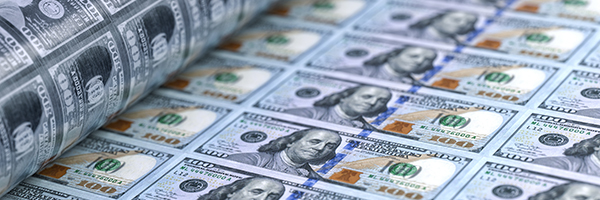All Posts

Please watch my new YouTube video: Quick Pick Amazon
Today’s Quick Pick is Amazon.com (AMZN)–despite the current tariff panic. While the stock is down due to the broad market sell-off and concerns over tariffs impacting its supply chain, I believe Amazon’s size and logistical power will help it mitigate these challenges. The company can pressure suppliers, adjust pricing algorithms, and shift sourcing to keep costs lower than competitors, potentially gaining an edge as inflation rises. Though these advantages may not be evident in the upcoming April earnings report, I expect Amazon to emerge stronger in the long term, making it a compelling buy once the market shifts from indiscriminate selling to evaluating winners and losers.

Nvidia hit with surprise effective ban on chip sales to China
Just days after Nvidia and otherrchip stocks rallied on news that thee Trump Administration would pause tariffs on chips and electronic goods, the White House has informed the company it would require a special license for exports of its H20 chips. The H20 chips were designed especially for the Chinese market in an effort to comply with U.S. restrictions on chip exports to China. No licenses for shipments into China have ever been granted, given the US government’s concern that the chips could be used to build AI supercomputers in the country, so the new rules are effectively a ban.
Shares of Nvidia closed down 6.87% today, April 16

Emergency Special Report Part 2: When to buy this drop–Hint NOT YET!–adding new 6th (of 6) centipede shoes
Is it time to get in, to snap up bargains, before stock prices recover. To which I say, Not yet. Bear markets, and remember that we’re now in a Bear market, are notorious for setting bear traps for investors who get carried away at the prospect of heady profits from buying on the dip. Bear market traps dangle just enough of a juicy bounce in front of hungry investors to get them to put cash into stocks–and then spring the trap of eating that cash all up in a renewed downturn. So when should you think about getting in? Almost no one ever gets a bottom absolutely right. But you do want to be relatively correct on finding the bottom and to avoid, to the degree you can, the losses from a Bear trap. I’m really reluctant to use past drops and Bear markets as a pattern for this moment. John Auther had a good post on Bloomberg on April 8 on how the drop and then the bounce resembled the market meltdown of 2008. The massive selling and then recovery reminds him of big selling in after the Lehman debacle in October 2008 that marked what calls hevthe end of the beginning in that bear. The actual bottom, he notes, came five months later. The difference this time, I’d say, is that we still haven’t seen the end of the potential stream of bad news. We still have to hear about recession/no recession, more Trump tariffs, spike in inflation/no spike, trade war retaliation, and more. We could get bad news, even really surprising bad news, on any of these fronts that would lead to another leg down in the financial markets. In other words, real world evnts that have yet to be decided could mean we’re closer to or further away from a bottom to this Bear market.

Filing in Federal Register says new tariffs on chips, drugs on the way
President Donald Trump is pressing ahead with plans to impose tariffs on semiconductor and pharmaceutical imports. Notices Monday in the Federal Register said the Commerce Department would investigate the impact on U.S. national security of “imports of semiconductors and semiconductor manufacturing equipment” as well as “pharmaceuticals and pharmaceutical ingredients, including finished drug products.”

The U.S. is holding the most painful end of the trade war stick
Goldman Sachs has taken a look at how difficult it would be for U.S. companies to find alternatives to Chinese sources of supply in a global trade/tariff war. And the picture isn’t very pretty.

Very real differences between the Republican House and Senate could still doom Trump’s “big, beautiful” spending bill
When the House and Senate convene again on April 28, Republicans will test whether the extremely precarious deals they sort of hammered out before leaving town will hold up so that they can deliver President Donald Trump’s big beautiful spending bill (for the 2025 fiscal year that started in October 2024) with its $5.5 trillion or so in tax cuts, its money for border and immigration crackdowns, and an increase in the debt ceiling. How shaky are those deals? The Washington Post this morning put together a detailed list of examples that show how little actual agreement there is between the House and the Senate.

Citigroup, Morgan Stanley cut S&P 500 earnings estimates
Morgan Stanley (MS) and Citigroup (C) have cut their estimates for 2025 earnings with a warning that tariffs will curb profit growth.

I hope the changes in those tech tariffs are now totally clear
Commerce Secretary Howard Lutnick said on Sunday the administration’s decision to exclude smartphones, computers and other popular electronic items from reciprocal tariffs was just temporary. The items will be subject to “semiconductor tariffs, expected to be implemented in “a month or two,” Lutnick said in an interview with ABC. “All those products are going to come under semiconductors, and they’re going to have a special focus type of tariff to make sure that those products get reshored.” President Donald Trump on Friday exempted a host of consumer electronic devices from reciprocal tariffs that include 125% tariffs on Chinese imports and 10% baseline tariffs on other countries. President Trump himself on Sunday posted that phones, computers and other popular electronic items will still be hit by tariffs.

Saturday Night Quarterback (on a Sunday) says, For the week ahead…
Maybe the tariff chaos will relent enough this week for investors and traders to pay attention to very important bank earnings reports. I’m looking for clues consumer debt, corporate loams, and stress in the financial system So far bank earnings reports are mixed.

What?! Trump exempts smartphones, computers and other electronic components are exempt from tariffs
Late Friday, April 11, the Trump administration announced that smartphones, computers and other electronic components are exempt from reciprocal tariffs, days after the United States imposed the highest levies on foreign goods in a century.

Now the TIPS market is showing stress too?
Inflation-linked bonds, TIPS or Treasury Inflation-Protected Securities–are the biggest losers in this month’s Treasury market selloff. The cause of the drop in this market extends beyond damage done by rising inflation expectations. The problem also is a result of a drop in liquidity on the TIPS market. And as such it’s a sign of increasing stress in the financial markets in general. (My YouTube video today is about stress in another are of the system–the growing inability of banks to sell on debt on their books from private-equity buyout deals.)

Consumer sentiment plunges again; inflation expectations soar
The latest University of Michigan consumer sentiment survey released Friday showed sentiment hitting its lowest level since June 2022. The index slid to a reading of 50.8, below the 57 seen last month and the 53.8 expected by economists.
Pessimism about inflation outlook soared again, as one-year inflation expectations jumped to 6.7%–the highest since 1981-—from 4.9% the prior month.

Please watch my new YouTube video: Where’s the systemic risk this time?
Today’s Hot Money Move is Where’s the Systemic Risk This Time? I’m watching the banking sector for signs of a liquidity crunch-—specifically, the growing pile of “stranded loans” from private equity buyouts. Banks lent billions for these deals but now can’t offload the debt to investors, locking up capital that should be flowing elsewhere. If this logjam gets worse, the Fed could see it as systemic risk—-just like in 2008 or 2020-—and step in with a lifeline. The Play: Watch mid-tier banks (think PNC, not JPMorgan) when earnings drop in April. If they start warning about stuck loans, it’s a signal the Fed might move. That’s when liquidity fears could turn into a market-wide event. For now, it’s a waiting game—-but one worth tracking closely.

China raises tariffs on U.S. goods to 125% from 84%
China retaliated against President Donald Trump’s latest tariffs by hiking duties on all U.S. goods. Beijing will raise tariffs on all U.S. goods to 125% from 84% starting April 12, the Ministry of Finance said on Friday, after the White House clarified that levies on Chinese goods rose to 145% this year. This will be the last increase in tariffs from China–which, it turns out, isn’t because China has decided to be kind. “Given that American goods are no longer marketable in China under the current tariff rates, if the United States further raises tariffs on Chinese exports, China will disregard such measures,” according to the statement from the Ministry of Finance. Tariffs are now at levels set to halt most all trade between the world’s biggest economies.

Even a 10% global tariff is a big deal for inflation and economic growth
It’s easy to get so caught up in the current increases and decreases of the Trump tariffs that we lose track of how big an increase even the reduced 10% global tariff that President Donald Trump announced on Wednesday, April 9, is from the pre-Trump rates. At the end of 2024, the average effective tariff rate for the United States was 2.2%, according to the World Trade Organization (WTO).



